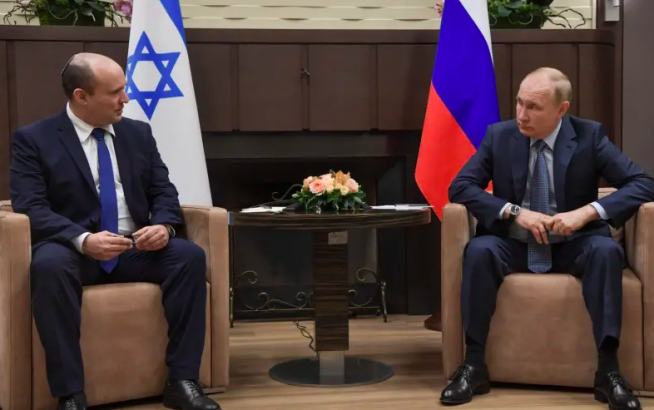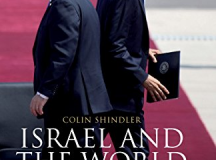Gerald M Steinberg is emeritus professor and founder of the Program on Conflict Management and Negotiation at Bar Ilan University, and heads the Institute for NGO Research. His book, ‘Menachem Begin and the Egypt-Israel Peace Process’, with Ziv Rubinovitz, was published in 2019. (A shorter version of this analysis was published in the Jerusalem Post.)
Prime Minister Naftali Bennett’s dramatic flights to Moscow and then to Berlin on 5 March generated a great deal of interest, but the core questions on why he went and what he accomplished remain unanswered. As Vladimir Putin’s war against Ukraine grinds on, adding to the death, destruction, and flight of refugees hour after hour, these questions have only become more acute.
At first, Bennett’s mission was explained as an attempt to reach a negotiated ceasefire and thereby save many lives. Bennett was cast in the role of mediator and peace-broker, uniquely able to talk to both sides – Russian leader Putin and Ukraine’s President Zelensky. His efforts were reportedly coordinated with, or at least reported in advance to, the U.S. government, as well as with German Chancellor Scholz, who had visited Jerusalem a few days before, and French President Macron.
In the initial reports of many Israeli commentators and analysts, the undertaking was heroic and placed Jerusalem in the top echelons of international power brokers. Some noted the chasm between the NGO and UN-led campaigns to isolate the Jewish state as a leper through the labels of ‘apartheid’, on the one hand, and the high-flying status of a global peace maker, on the other. Surely this was a major upgrade in both Bennett’s own domestic political image and that of Israel around the world, with additional benefits regarding other Israeli interests, including stopping the Iranian nuclear programme.
From the beginning, this was explanation was a stretch, and as the Russian attacks escalated, and the death toll grew, accompanied by images of refugees fleeing Ukrainian cities, the prospects of a quick ceasefire agreement faded. Another and more credible explanation was floated, portraying the three hour meeting between Bennett and Putin as an opportunity to assess and report on the Russian leader’s thoughts and mental state. (A number of long-distance analyses of Putin’s psychology and frame of mind have been published claiming that he had entirely isolated himself and lost touch with reality.)
However, there is another interpretation, which seems more plausible and less appealing, and rests on the fundamental distinction between a mediated peace agreement and unilateral surrender. Putin’s frequently stated objective is to confront the US and NATO by demonstrating Russian strength and destructive power by systematically pounding and terrorising Ukrainian cities. The surrender of Zelensky and the Ukrainian forces, and the imposition of a puppet government run out of the Kremlin would mark the achievement of those objectives.
If Putin is using Bennett as a passive messenger to convey these terms of surrender to Zelensky, the Biden administration, and European leaders, this would be far removed from the actions of an active mediator and peace broker. A diplomatic agreement, beginning with a ceasefire, consists of mutual concessions – both sides give up something significant for the sake of peace and an end to destruction. The core job of the mediator in such circumstances is to help facilitate the terms for this transition and then an agreement, including providing a communications channel when the two parties are not speaking to each other.
In many other cases, the mediator is more actively involved, proposing creative options to overcome stalemates, and providing security or other guarantees. To end the 1973 Yom Kippur war, US Secretary of State Kissinger shuttled from Jerusalem to Cairo in brokering a ceasefire that included an American monitoring force, and was a form of ‘pre-negotiation.’ A few years later, during the historic negotiations between Begin and Sadat that led to the 1979 treaty with Egypt, when a third-party was needed, the US government facilitated the Camp David talks, as well as ‘side payments’ through substantial economic and military aid to both sides. The Americans also helped overcome a major obstacle by guaranteeing Israel’s access to oil in exchange for withdrawal from the captured petroleum fields in the Sinai.
In the case of Russia and Ukraine, Israel has little to offer, perhaps other than a communications channel. Jerusalem has no real power or leverage and is not in a position to act as an economic or security guarantor for either side. It is possible that Putin, like other leaders far removed from the realities of US-Israel relations, subscribes to the myth of exaggerated Israeli and Jewish influence in Washington. But even if this is accurate, it is a thin reed on which build hopes of a negotiated end to the war.
Another condition usually required for successful mediation during a conflict is known as ‘ripeness’ – referring to the condition in which both sides have suffered enough, and any further gains through additional fighting appear to be lower than the likely costs (a ‘mutually hurting stalemate’). At this stage, the relationship between the warring parties shifts from zero-sum (one side’s gain is the other’s loss) to win-win (both benefit). In the 1948 War of Independence and the 1973 Yom Kippur War, mediators were able to broker armistice agreements when this stage was reached. In contrast, in the absence of ripeness, when at least one side seeks to use the facade of negotiations to prepare for more attacks, the would-be mediator is also blamed, as in the case of Arafat and Norway during the infamous Oslo process.
In the Russian invasion, there is no clear evidence of ripeness or a transition away from a zero-sum conflict, as the conquest and destruction in Ukrainian cities continues. While there are many claims and videos of successful Ukrainian counter-attacks, it is difficult to separate the disinformation from reality. It is possible that the Ukrainian resistance and level of Russian casualties is more than Putin had planned on, and the same for the Western economic sanctions, but this is entirely speculative.
For these reasons, a darker scenario cannot be excluded, in which Putin is using Israel and Prime Minister Bennett more as a messenger to communicate and press his terms for total surrender of Ukraine, rather than as a third-party mediator, facilitator and peace broker. Indeed, this claim has already been made and subsequently denied, but such accusations, regardless of the evidence, leave a stain. In this situation, the Israeli leadership would be well advised to stay away from any political role, regardless of good intentions. While diplomacy and optimism are important, particularly amidst terrible destruction, they need to be tempered by cold realism.





































